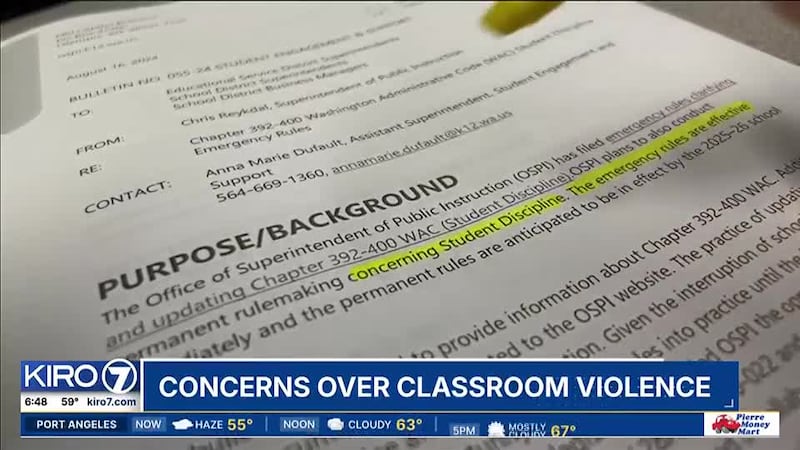As kids start the new school year, some families are worried about bullying and violent student behavior in the classroom.
“I felt like my son’s safety and security were put at risk,” said Nashika Forsman, a Tacoma mom in the Franklin-Pierce School District.
With the new school year, safety is top of mind for districts across Washington. In fact, the Washington Office of Superintendent of Public Instruction (OSPI) just handed out an “emergency rule” change impacting all schools when it comes to handling kids - and their bad behavior.
The rule clarifies some definitions and asks all districts to make sure their policies are consistent – but doesn’t significantly change how discipline works. And Forsman says in her eyes, the system now doesn’t work at all.
“My son is really sweet – a sweet young man,” Forsman said. Her son, 11-year-old Mahki Brown, just started sixth grade. They say last year, he repeatedly had trouble with another student.
“Like hands on type stuff,” Brown said.
“He keeps bullying my son,” Forsman said. “This boy pushed him on the ground,” she said. Forsman said she could not get her son moved to a different class last school year. Both felt there were no consequences for the other student.
“How do you feel the school handled it and the teachers handled it?” KIRO7′s Deedee Sun asked. “Bad. The principal and my teacher didn’t care,” Brown said.
“Really frustrating,” Forsman said. She said it impacted her son’s ability to learn in class. “My son was very uncomfortable,” she said.
Forsman says her concerns are also bigger picture when it comes to students who misbehave.
“I feel sorry for the teachers who can’t really do anything. Washington, the school system,” Forsman said.
She is far from alone in her concerns. In May, KIRO7 sent out a survey on classroom violence to teachers across Washington and more than 1,150 educators responded.
Just a few examples:
A veteran high school teacher in Tacoma said, “Students feel like they can say or do anything without repercussions that matter to them.”
A Snohomish County middle school teacher said, “Students are not only physically violent, but are emotionally abusive… with little or no discipline to discourage behavior.”
Some teachers described so much anxiety heading into class, knowing they would have confrontations with certain students, that they were physically ill. “I would be dry heaving in my car the whole way to school,” said a Tukwila teacher.
“I wasn’t sleeping, I had acid reflux and I had panic attacks when my alarm would go off during the week to wake up for school,” said a Federal Way teacher.
Superintendent Lance Goodpaster with the Franklin-Pierce School District recognizes that the recent changes to how student discipline is handled statewide comes with a learning curve.
In 2019, a new Washington law said school districts can’t use suspensions or expulsions in a zero-tolerance way – except for when a kid brings a gun to school. For example, a fight can’t trigger an automatic suspension. Instead, districts must try to find other solutions without excluding a student from class.
And additional protections apply for students who are special ed or have an IEP.
“Student behavior is an ongoing matter,” Goodpaster said.
The state has been moving away from suspensions for student discipline, whenever possible because research shows it just doesn’t work.
“We knew even then that (suspension) doesn’t change the behavior. It just puts it off for a week. And then that student has fallen behind and lost a week worth of instruction, and the behaviors haven’t changed,” Goodpaster said.
He says that does not mean no consequences.
“Accountability exists,” Goodpaster said. He says it’s just more nuanced.
One example for a solution might be a facilitated conversation between the aggressor and victim.
“Not only an apology, but this is what I’m going to do differently,” Goodpaster said. “The student who was a victim or involved deserves that. They deserve to feel heard,” he said.
As for this school year, OSPI sent out a bulletin on “Student Discipline Emergency Rules” that are “effective immediately.” In part, the rules aim to:
- Establish better expectations and requirements for local education agencies
- Clarifies definitions, like what is “exclusion” and what is “discretionary” discipline
- Asks staff to work towards “consistent enforcement of proper student behavior throughout each school”
Goodpaster reminds families that suspensions are still on the table for serious infractions. A discipline showed suspensions are in play for things like robbery, bringing drugs to school, assaulting a teacher, or a major injury fight.
“What’s your message for parents who are concerned about the safety of their kids?” Sun asked.
“We want to hear from them if they are worried or have those concerns,” Goodpaster said. “We are going to work with that child to change behavior while keeping your child safe. That’s the balance that we’re striving for,” he said.
He says in the case of Forsman’s son, he couldn’t go into specifics – but said it seems like communication broke down somewhere along the way. And Goodpaster says communication is key.
“It may or may not be a suspension. And if it’s not, we can communicate that with the parent. Here’s what’s happening and here’s why. I can’t give you all the details about the other child involved for various reasons. But I can assure you we’ve taken these steps,” Goodpaster said.
But Forsman worries the new way of student discipline isn’t working.
“It’s not fair to the teachers, and it’s not fair to the other students period,” she said.
As for Brown, he’s looking forward to attending a new school this year.
“I would like a cool, fresh start,” Brown said.
©2024 Cox Media Group








